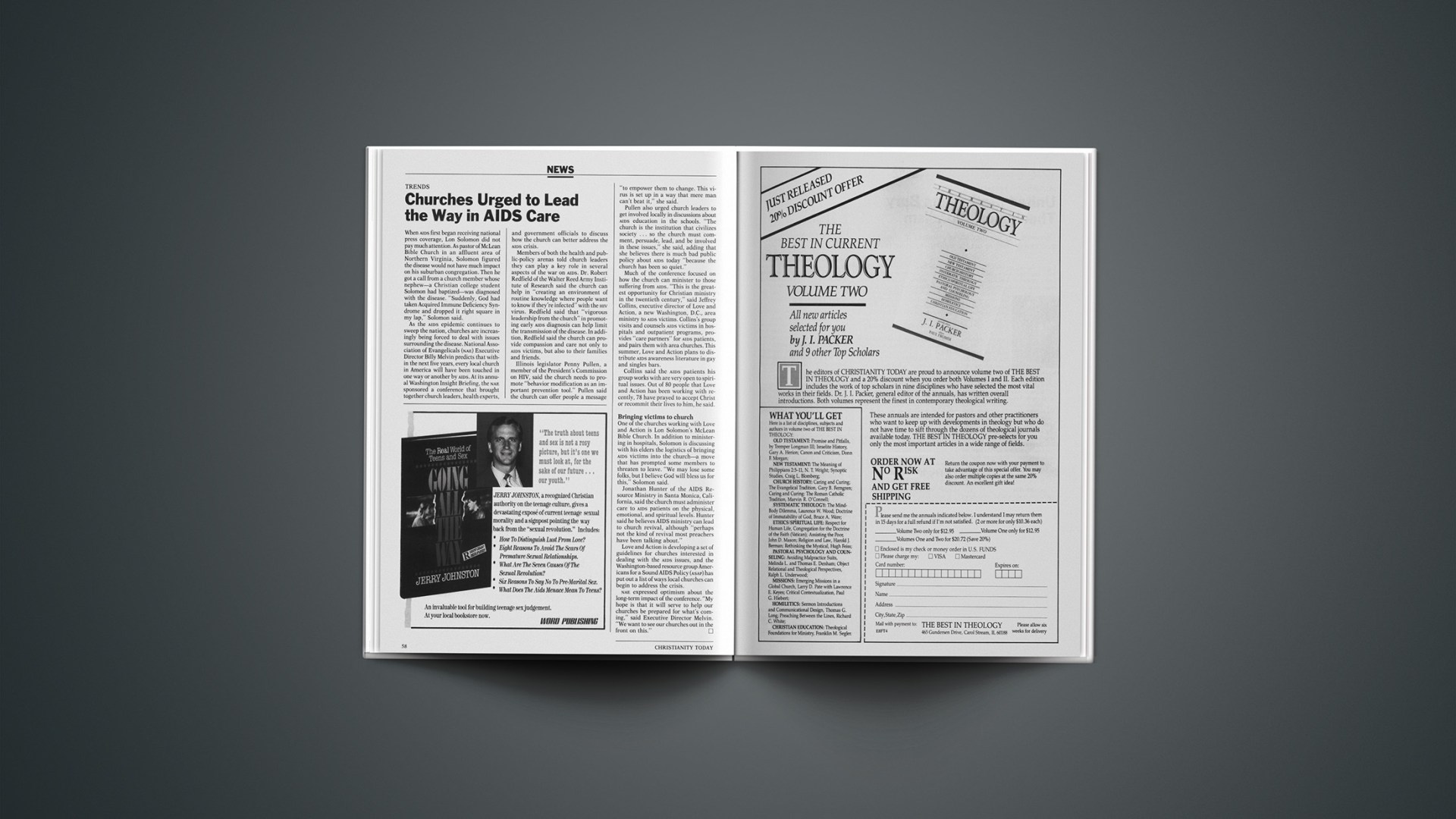TRENDS
When AIDS first began receiving national press coverage, Lon Solomon did not pay much attention. As pastor of McLean Bible Church in an affluent area of Northern Virginia, Solomon figured the disease would not have much impact on his suburban congregation. Then he got a call from a church member whose nephew—a Christian college student Solomon had baptized—was diagnosed with the disease. “Suddenly, God had taken Acquired Immune Deficiency Syndrome and dropped it right square in my lap,” Solomon said.
As the AIDS epidemic continues to sweep the nation, churches are increasingly being forced to deal with issues surrounding the disease. National Association of Evangelicals (NAE) Executive Director Billy Melvin predicts that within the next five years, every local church in America will have been touched in one way or another by AIDS. At its annual Washington Insight Briefing, the NAE sponsored a conference that brought together church leaders, health experts, and government officials to discuss how the church can better address the AIDS crisis.
Members of both the health and public-policy arenas told church leaders they can play a key role in several aspects of the war on AIDS. Dr. Robert Redfield of the Walter Reed Army Institute of Research said the church can help in “creating an environment of routine knowledge where people want to know if they’re infected” with the hiv virus. Redfield said that “vigorous leadership from the church” in promoting early AIDS diagnosis can help limit the transmission of the disease. In addition, Redfield said the church can provide compassion and care not only to AIDS victims, but also to their families and friends.
Illinois legislator Penny Pullen, a member of the President’s Commission on HIV, said the church needs to promote “behavior modification as an important prevention tool.” Pullen said the church can offer people a message “to empower them to change. This virus is set up in a way that mere man can’t beat it,” she said.
Pullen also urged church leaders to get involved locally in discussions about AIDS education in the schools. “The church is the institution that civilizes society … so the church must comment, persuade, lead, and be involved in these issues,” she said, adding that she believes there is much bad public policy about AIDS today “because the church has been so quiet.”
Much of the conference focused on how the church can minister to those suffering from AIDS. “This is the greatest opportunity for Christian ministry in the twentieth century,” said Jeffrey Collins, executive director of Love and Action, a new Washington, D.C., area ministry to AIDS victims. Collins’s group visits and counsels AIDS victims in hospitals and outpatient programs, provides “care partners” for AIDS patients, and pairs them with area churches. This summer, Love and Action plans to distribute AIDS awareness literature in gay and singles bars.
Collins said the AIDS patients his group works with are very open to spiritual issues. Out of 80 people that Love and Action has been working with recently, 78 have prayed to accept Christ or recommit their lives to him, he said.
Bringing Victims To Church
One of the churches working with Love and Action is Lon Solomon’s McLean Bible Church. In addition to ministering in hospitals, Solomon is discussing with his elders the logistics of bringing AIDS victims into the church—a move that has prompted some members to threaten to leave. “We may lose some folks, but I believe God will bless us for this,” Solomon said.
Jonathan Hunter of the AIDS Resource Ministry in Santa Monica, California, said the church must administer care to AIDS patients on the physical, emotional, and spiritual levels. Hunter said he believes AIDS ministry can lead to church revival, although “perhaps not the kind of revival most preachers have been talking about.”
Love and Action is developing a set of guidelines for churches interested in dealing with the AIDS issues, and the Washington-based resource group Americans for a Sound AIDS Policy (ASAP) has put out a list of ways local churches can begin to address the crisis.
NAE expressed optimism about the long-term impact of the conference. “My hope is that it will serve to help our churches be prepared for what’s coming,” said Executive Director Melvin. “We want to see our churches out in the front on this.”










